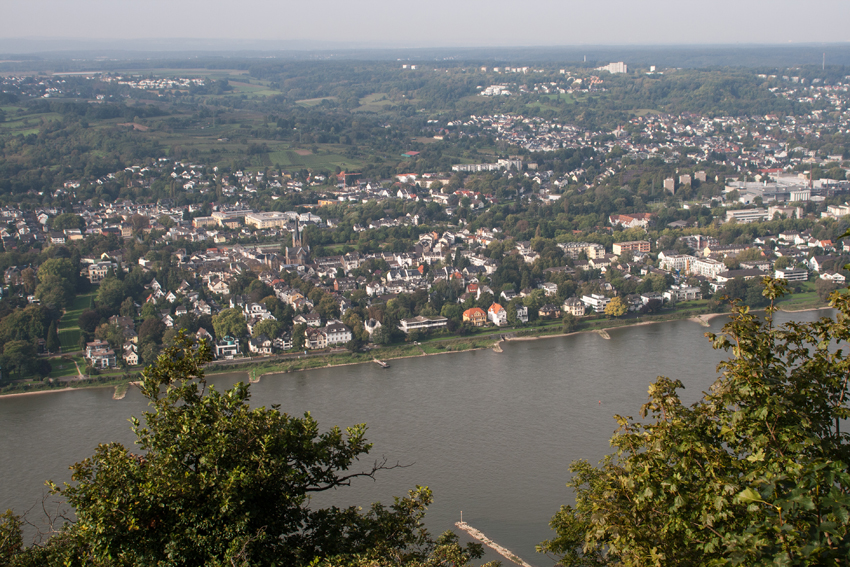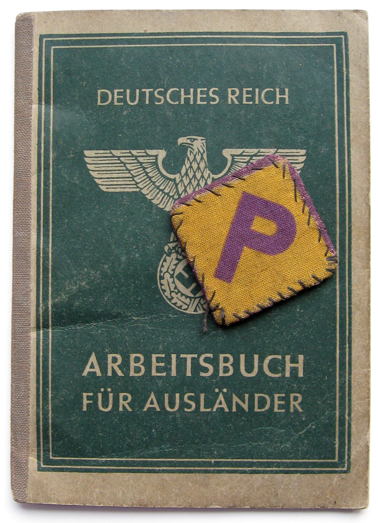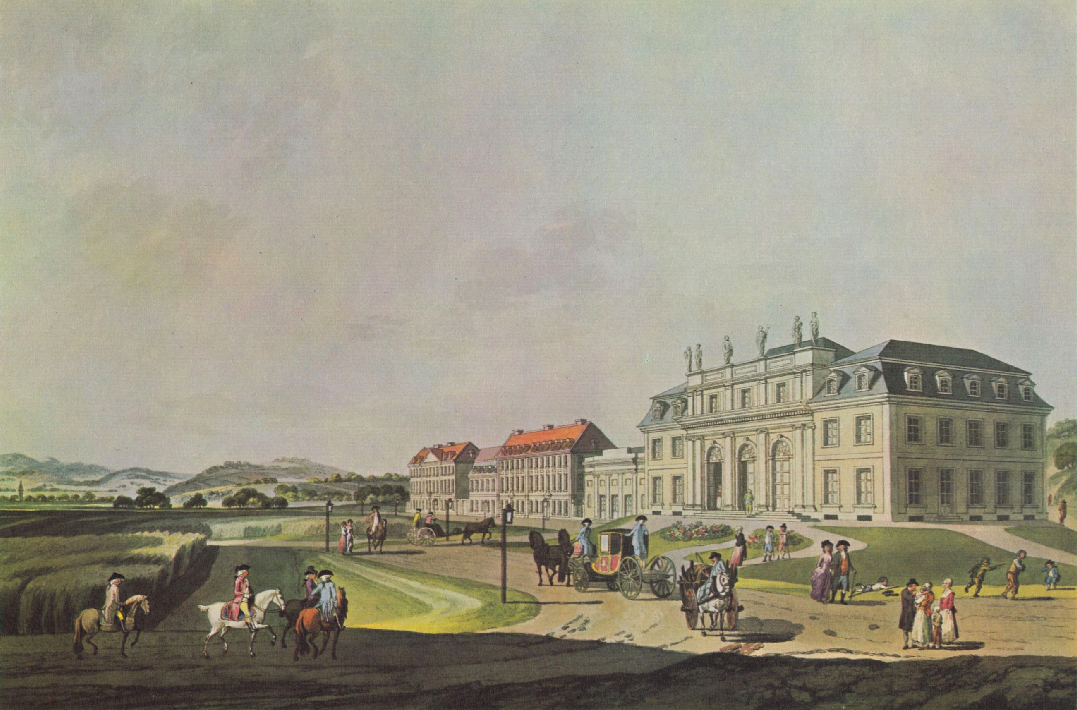|
Bad Godesberg
Bad Godesberg ( ksh, Bad Jodesbersch) is a borough ('' Stadtbezirk'') of Bonn, southern North Rhine-Westphalia, Germany. From 1949 to 1999, while Bonn was the capital of West Germany, most foreign embassies were in Bad Godesberg. Some buildings are still used as branch offices or consulates. Geography Bad Godesberg is located along the hills and cliffs of the west bank of the Rhine river, in west central Germany. Godesberg is also the name of the steep hill, of volcanic origin, on the top of which are the ruins of the Godesburg, a castle destroyed in 1583 during the Cologne War. History The following events occurred, per year: * 722 - First official record of the town, which was named after a nearby mountain, the Woudenesberg (later Godesberg), a basalt cone where the Ubii, a Germanic tribe, worshipped the god Wotan. * 1210 - On 15 October, Archbishop of Cologne Dietrich I lays the foundation stone of the Godesburg fortress on the Godesberg mountain. * 1583 - On 17 Decemb ... [...More Info...] [...Related Items...] OR: [Wikipedia] [Google] [Baidu] |
Godesburg
300px, Godesburg castle in Germany. The Godesburg is a castle in Bad Godesberg, a formerly independent part of Bonn, Germany. Built in the early 13th century on the Godesberg, a hill of volcanic origin, it was largely destroyed following a siege in 1583 at the start of the Cologne War. In 1891, the German emperor Wilhelm II donated the castle's ruin to the city of Bad Godesberg. In 1959, the ruin was rebuilt according to plans by Gottfried Böhm, to house a hotel and restaurant. Today, the restaurant is still in operation, but the hotel tract has been divided into apartments. Location The site has a controversial history. Growing out of the nineteenth-century ''Heimat'' movement, historians speculated that in the pre-Christian era, the inhabitants probably used the peak to call to the god ''Wotan'', the god of war, death and the hunt, and other attributes, establishing a custom that led eventually to the erection of a house of prayer on the site. They found early mention of ... [...More Info...] [...Related Items...] OR: [Wikipedia] [Google] [Baidu] |
Siege Of Godesberg
The siege of Godesberg, 18 November – 17 December 1583, was the first major siege of the Cologne War (1583–1589). Seeking to wrest control of an important fortification, Bavarian and mercenary soldiers surrounded the Godesberg, and the village then of the same name, now Bad Godesberg, located at its foot. On top of the mountain sat a formidable fortress, similarly named Godesburg, built in the early 13th century during a contest over the election of two competing archbishops. Towering over the Rhine valley, the Godesburg's strategic position commanded the roads leading to and from Bonn, the Elector of Cologne's capital city, and Cologne, the region's economic powerhouse. Over time, the Electors strengthened its walls and heightened its towers. They added a small residence in the 14th century and the ''donjon'' (also called a ''Bergfried'' or keep) developed as a stronghold of the Electoral archives and valuables. By the mid-16th century, the Godesburg was considered nearly i ... [...More Info...] [...Related Items...] OR: [Wikipedia] [Google] [Baidu] |
Social Democratic Party Of Germany
The Social Democratic Party of Germany (german: Sozialdemokratische Partei Deutschlands, ; SPD, ) is a centre-left social democratic political party in Germany. It is one of the major parties of contemporary Germany. Saskia Esken has been the party's leader since the 2019 leadership election together with Lars Klingbeil, who joined her in December 2021. After Olaf Scholz was elected chancellor in 2021 the SPD became the leading party of the federal government, which the SPD formed with the Greens and the Free Democratic Party, after the 2021 federal election. The SPD is a member of 11 of the 16 German state governments and is a leading partner in seven of them. The SPD was established in 1863. It was one of the earliest Marxist-influenced parties in the world. From the 1890s through the early 20th century, the SPD was Europe's largest Marxist party, and the most popular political party in Germany. During the First World War, the party split between a pro-war mainstream ... [...More Info...] [...Related Items...] OR: [Wikipedia] [Google] [Baidu] |
Allies Of World War II
The Allies, formally referred to as the United Nations from 1942, were an international military coalition formed during the Second World War (1939–1945) to oppose the Axis powers, led by Nazi Germany, Imperial Japan, and Fascist Italy. Its principal members by 1941 were the United Kingdom, United States, Soviet Union, and China. Membership in the Allies varied during the course of the war. When the conflict broke out on 1 September 1939, the Allied coalition consisted of the United Kingdom, France, and Poland, as well as their respective dependencies, such as British India. They were soon joined by the independent dominions of the British Commonwealth: Canada, Australia, New Zealand and South Africa. Consequently, the initial alliance resembled that of the First World War. As Axis forces began invading northern Europe and the Balkans, the Allies added the Netherlands, Belgium, Norway, Greece, and Yugoslavia. The Soviet Union, which initially had a nonaggression pa ... [...More Info...] [...Related Items...] OR: [Wikipedia] [Google] [Baidu] |
Forced Labour Under German Rule During World War II
The use of slave and forced labour in Nazi Germany (german: Zwangsarbeit) and throughout German-occupied Europe during World War II took place on an unprecedented scale. It was a vital part of the German economic exploitation of conquered territories. It also contributed to the mass extermination of populations in occupied Europe. The Germans abducted approximately 12 million people from almost twenty European countries; about two thirds came from Central Europe and Eastern Europe.Part1 an Part 2 . Many workers died as a result of their living conditionsextreme mi ... [...More Info...] [...Related Items...] OR: [Wikipedia] [Google] [Baidu] |
Godesberg Memorandum
The Godesberg Memorandum is a document issued by Adolf Hitler in the early hours of 24 September 1938 concerning the Sudetenland and amounting to an ultimatum addressed to the government of Czechoslovakia. It was named after Bad Godesberg, where Hitler had met Neville Chamberlain for long talks on 23 September continuing into the next day. Background At the time of the collapse of the Austro-Hungarian Empire, the Sudetenland was a German-speaking part of the Empire which fell to the new state of Czechoslovakia, itself dominated by the Czechs. Initially, many Sudeten Germans wished to become part of the new German-speaking state of German Austria, and later they hoped to join Austria. However, the Treaty of Saint-Germain of 1919 confirmed the inclusion of the German-speaking territories within Czechoslovakia. By the beginning of 1938 most Sudetens aspired to be integrated into Nazi Germany, which was fast advancing in economic success and international prestige. Following an a ... [...More Info...] [...Related Items...] OR: [Wikipedia] [Google] [Baidu] |
Czechoslovakia
, rue, Чеськословеньско, , yi, טשעכאסלאוואקיי, , common_name = Czechoslovakia , life_span = 1918–19391945–1992 , p1 = Austria-Hungary , image_p1 = , s1 = Czech Republic , flag_s1 = Flag of the Czech Republic.svg , s2 = Slovakia , flag_s2 = Flag of Slovakia.svg , image_flag = Flag of Czechoslovakia.svg , flag = Flag of Czechoslovakia , flag_type = Flag(1920–1992) , flag_border = Flag of Czechoslovakia , image_coat = Middle coat of arms of Czechoslovakia.svg , symbol_type = Middle coat of arms(1918–1938 and 1945–1961) , image_map = Czechoslovakia location map.svg , image_map_caption = Czechoslovakia during the interwar period and the Cold War , national_motto = , anthems = ... [...More Info...] [...Related Items...] OR: [Wikipedia] [Google] [Baidu] |
Sudetenland
The Sudetenland ( , ; Czech and sk, Sudety) is the historical German name for the northern, southern, and western areas of former Czechoslovakia which were inhabited primarily by Sudeten Germans. These German speakers had predominated in the border districts of Bohemia, Moravia, and Czech Silesia since the Middle Ages. Sudetenland had been since the 9th century an integral part of the Czech state (first within the Duchy of Bohemia and later the Kingdom of Bohemia) both geographically and politically. The word "Sudetenland" did not come into being until the early part of the 20th century and did not come to prominence until almost two decades into the century, after World War I, when Austria-Hungary was dismembered and the Sudeten Germans found themselves living in the new country of Czechoslovakia. The ''Sudeten crisis'' of 1938 was provoked by the Pan-Germanist demands of Nazi Germany that the Sudetenland be annexed to Germany, which happened after the later Munich Agreeme ... [...More Info...] [...Related Items...] OR: [Wikipedia] [Google] [Baidu] |
Adolf Hitler
Adolf Hitler (; 20 April 188930 April 1945) was an Austrian-born German politician who was dictator of Nazi Germany, Germany from 1933 until Death of Adolf Hitler, his death in 1945. Adolf Hitler's rise to power, He rose to power as the leader of the Nazi Party, becoming the Chancellor of Germany, chancellor in 1933 and then taking the title of in 1934. During his dictatorship, he initiated European theatre of World War II, World War II in Europe by invasion of Poland, invading Poland on 1 September 1939. He was closely involved in military operations throughout the war and was central to the perpetration of the Holocaust: the genocide of Holocaust victims, about six million Jews and millions of other victims. Hitler was born in Braunau am Inn in Austria-Hungary and was raised near Linz. He lived in Vienna later in the first decade of the 1900s and moved to Germany in 1913. He was decorated during his Military career of Adolf Hitler, service in the German Army in Worl ... [...More Info...] [...Related Items...] OR: [Wikipedia] [Google] [Baidu] |
Neville Chamberlain
Arthur Neville Chamberlain (; 18 March 18699 November 1940) was a British politician of the Conservative Party who served as Prime Minister of the United Kingdom from May 1937 to May 1940. He is best known for his foreign policy of appeasement, and in particular for his signing of the Munich Agreement on 30 September 1938, ceding the German-speaking Sudetenland region of Czechoslovakia to Nazi Germany led by Adolf Hitler. Following the German invasion of Poland on 1 September 1939, which marked the beginning of the Second World War, Chamberlain announced the declaration of war on Germany two days later and led the United Kingdom through the first eight months of the war until his resignation as prime minister on 10 May 1940. After working in business and local government, and after a short spell as Director of National Service in 1916 and 1917, Chamberlain followed his father Joseph Chamberlain and elder half-brother Austen Chamberlain in becoming a Member of Parliament in t ... [...More Info...] [...Related Items...] OR: [Wikipedia] [Google] [Baidu] |
President Of Germany
The president of Germany, officially the Federal President of the Federal Republic of Germany (german: link=no, Bundespräsident der Bundesrepublik Deutschland),The official title within Germany is ', with ' being added in international correspondence; the official English title is President of the Federal Republic of Germany is the head of state of Germany. Under the 1949 constitution (Basic Law) Germany has a parliamentary system of government in which the chancellor (similar to a prime minister or minister-president in other parliamentary democracies) is the head of government. The president has far-reaching ceremonial obligations, but also the right and duty to act politically. They can give direction to general political and societal debates and have some important "reserve powers" in case of political instability (such as those provided for by Article 81 of the Basic Law). The president also holds the prerogative to grant pardons on behalf of the federation. The German ... [...More Info...] [...Related Items...] OR: [Wikipedia] [Google] [Baidu] |
Redoute, Bad Godesberg
The Redoute in Bad Godesberg, now part of Bonn, North Rhine-Westphalia, Germany, is a hall opened in 1792 for balls of the court of Archduke Maximilian Francis of Austria. When Bonn was the location of the government of the Federal Republic of Germany, from 1949 to 1990, state receptions were held at the Redoute. Today, the listed historical building is used for events. History When the spring water in Godesberg was found to be of spa quality, Archduke Maximilian Francis of Austria developed the town as a spa. The Redoute was built in Neoclassical style from 1790, designed by . It was planned to be used for balls and other entertainment of the court and spa visitors. It was opened in 1792, and was a venue for balls, games, performances of plays, opera, ballet and concerts of the court orchestra, with Ludwig van Beethoven as a violinist and violist. In 1792, Beethoven played for Joseph Haydn, and they planned there that Beethoven would visit Vienna again to become a master student ... [...More Info...] [...Related Items...] OR: [Wikipedia] [Google] [Baidu] |

.jpg)







